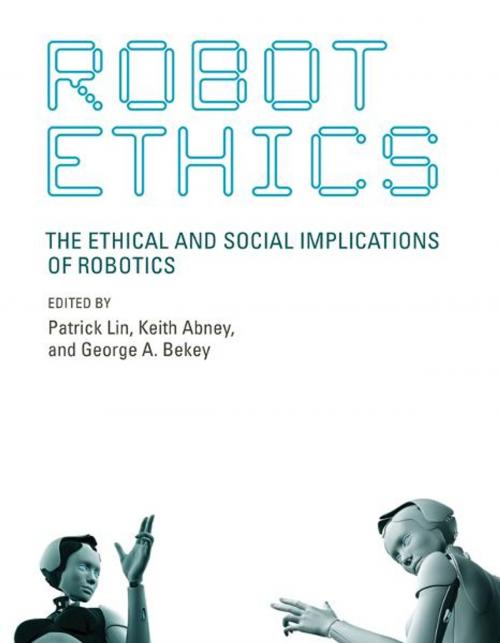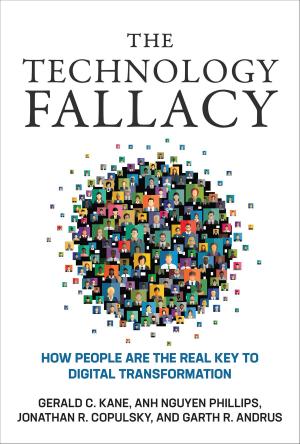Robot Ethics
The Ethical and Social Implications of Robotics
Nonfiction, Science & Nature, Technology, Robotics, Religion & Spirituality, Philosophy, Ethics & Moral Philosophy| Author: | Colin Allen, Wendell Wallach, James J. Hughes, Selmer Bringsjord, Joshua Taylor, Noel Sharkey, Marcello Guarini, Paul Bello, Gert-Jan Lokhorst, Jeroen van den Hoven, Richard O'Meara, Peter Asaro, M. Ryan Calo, Matthias Scheutz, David Levy, Blay Whitby, Jason Borenstein, Yvette Pearson, Amanda Sharkey, Stephen Petersen, Rob Sparrow, Kevin Warwick, Anthony Beavers, Gianmarco Veruggio, Patrick Lin, George A. Bekey, Keith Abney | ISBN: | 9780262297752 |
| Publisher: | The MIT Press | Publication: | December 9, 2011 |
| Imprint: | The MIT Press | Language: | English |
| Author: | Colin Allen, Wendell Wallach, James J. Hughes, Selmer Bringsjord, Joshua Taylor, Noel Sharkey, Marcello Guarini, Paul Bello, Gert-Jan Lokhorst, Jeroen van den Hoven, Richard O'Meara, Peter Asaro, M. Ryan Calo, Matthias Scheutz, David Levy, Blay Whitby, Jason Borenstein, Yvette Pearson, Amanda Sharkey, Stephen Petersen, Rob Sparrow, Kevin Warwick, Anthony Beavers, Gianmarco Veruggio, Patrick Lin, George A. Bekey, Keith Abney |
| ISBN: | 9780262297752 |
| Publisher: | The MIT Press |
| Publication: | December 9, 2011 |
| Imprint: | The MIT Press |
| Language: | English |
Prominent experts from science and the humanities explore issues in robot ethics that range from sex to war.
Robots today serve in many roles, from entertainer to educator to executioner. As robotics technology advances, ethical concerns become more pressing: Should robots be programmed to follow a code of ethics, if this is even possible? Are there risks in forming emotional bonds with robots? How might society—and ethics—change with robotics? This volume is the first book to bring together prominent scholars and experts from both science and the humanities to explore these and other questions in this emerging field.
Starting with an overview of the issues and relevant ethical theories, the topics flow naturally from the possibility of programming robot ethics to the ethical use of military robots in war to legal and policy questions, including liability and privacy concerns. The contributors then turn to human-robot emotional relationships, examining the ethical implications of robots as sexual partners, caregivers, and servants. Finally, they explore the possibility that robots, whether biological-computational hybrids or pure machines, should be given rights or moral consideration.
Ethics is often slow to catch up with technological developments. This authoritative and accessible volume fills a gap in both scholarly literature and policy discussion, offering an impressive collection of expert analyses of the most crucial topics in this increasingly important field.
Prominent experts from science and the humanities explore issues in robot ethics that range from sex to war.
Robots today serve in many roles, from entertainer to educator to executioner. As robotics technology advances, ethical concerns become more pressing: Should robots be programmed to follow a code of ethics, if this is even possible? Are there risks in forming emotional bonds with robots? How might society—and ethics—change with robotics? This volume is the first book to bring together prominent scholars and experts from both science and the humanities to explore these and other questions in this emerging field.
Starting with an overview of the issues and relevant ethical theories, the topics flow naturally from the possibility of programming robot ethics to the ethical use of military robots in war to legal and policy questions, including liability and privacy concerns. The contributors then turn to human-robot emotional relationships, examining the ethical implications of robots as sexual partners, caregivers, and servants. Finally, they explore the possibility that robots, whether biological-computational hybrids or pure machines, should be given rights or moral consideration.
Ethics is often slow to catch up with technological developments. This authoritative and accessible volume fills a gap in both scholarly literature and policy discussion, offering an impressive collection of expert analyses of the most crucial topics in this increasingly important field.















